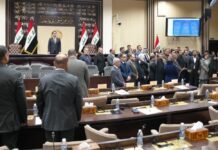The spokesperson for the government, Bassem Al-Awadi, has expressed grave concern about the proposal to close the American embassy. He emphasized that this move not only undermines the framework agreement but also poses a significant threat to Iraq’s stability. Al-Awadi stated that the Iraqi delegation was confused about the Arab resolution at the United Nations General Assembly meeting due to reservations about the two-state solution in line with the “criminalization of normalization” law.
During a media interview with Al-Mutla’, Al-Awadi emphasized that the Iraqi government has international obligations to uphold. Throughout history, diplomatic missions have been protected in accordance with international laws, customs, and traditions. Closing the American embassy would have significant consequences and repercussions.
Closing the American embassy is a dangerous decision that not only affects the framework agreement, but also has the potential to devastate Iraq.
Following the attack on the Swedish embassy, 16 ambassadors from the European Union announced that they would be closing their embassies and leaving Iraq, citing concerns for the safety of Sweden. If this is the fate of the Swedish embassy, one can only imagine what would happen if the embassy of the United States of America were targeted. Reports and analyses suggest that there would be no one left in Iraq.
The presence of the Western countries in Iraq is primarily reliant on the United States’ continued presence in the country. The international coalition’s presence is crucial in reassuring other nations that they are protected within Iraq. However, once the coalition withdraws, there will be no Western forces left in Iraq.
The parliamentary decision to “criminalize normalization” has prevented Iraq from fulfilling any foreign obligations since 1948. As a result, Iraq cannot agree to any resolution that includes the phrase “two-state solution”. The delegation thoroughly studied the issue from a legal standpoint and ultimately determined that approval of the resolution was necessary and important. The resolution originated from the Iraqi government, which invested significant effort into it. It included provisions such as a ceasefire and humanitarian aid passage. Iraq agreed to the resolution with reservations regarding the articles that included the two-state solution.
During a meeting with the Iraqi delegation, Palestinian President Mahmoud Abbas questioned why they had abstained from voting on the two-state solution decision, which is a demand of Palestine. Abbas also expressed that Hamas had welcomed and supported the decision. The Iraqi delegation was asked to explain their reservations about the decision.
The law criminalizing normalization requires Iraq to uphold the two-state solution, or risk violating Iraqi law.
Iraq consistently supports Palestine, but the “criminalization of normalization” law imposes new obligations.
Two countries reject the two-state solution: Iraq and Israel. Israel rejects it because it does not want to give a state to Palestine, while Iraq rejects it due to the law criminalizing normalization.





